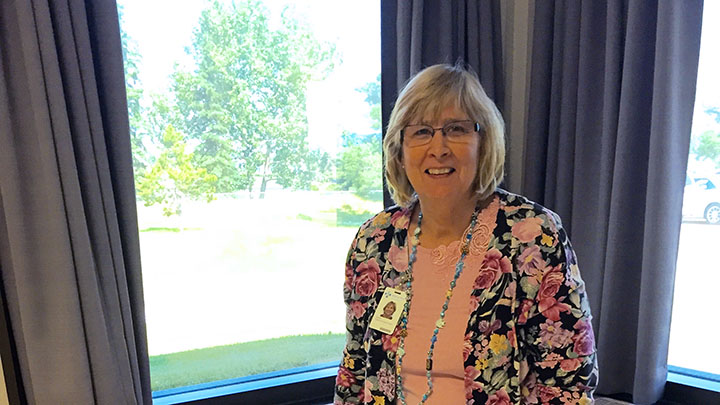
July 13, 2017

Irene Gladue, Site Manager at the AHS Northern Addictions Centre, stands in one of the opioid dependency program’s clinic rooms at the Northern Addictions Centre in Grande Prairie.
A new opioid dependency program has opened in Grande Prairie, increasing access to opioid replacement therapy, treatment and counselling services.
The Alberta Health Services (AHS) program, located at the Northern Addictions Centre, is the first of its kind in the region.
“Opioid dependency is a growing issue, and Alberta Health Services is working to increase access and availability of replacement treatment,” says Debra Morrison, Director, Addiction and Mental Health with AHS North Zone, West. “This program will help northern Albertans receive the care they need, closer to home. It will help save lives.”
The program began accepting patients May 29 and has the capacity to assist about 300 patients.
Irene Gladue, Site Manager at the AHS Northern Addictions Centre, says in the month and half it’s been operational, the program has worked with approximately 14 patients.
“We’ve received a lot of positive feedback from other health professionals and our counterparts across northern Alberta about being able to offer this,” says Gladue. “It’s a welcomed addition to the addiction and mental health services we currently offer.”
Gladue adds that one of the benefits of having the opioid dependency program at the Northern Addictions Centre Addiction is the continuum of care it allows them to provide to patients.
“If, for example, someone comes in solely for detox services, and they choose opioid replacement therapy on their path to recovery, then they can seamlessly move into that program here,” says Gladue.
Morrison adds, “Another benefit of locating this program at the Northern Addictions Centre is the ability it provides to serve residents throughout the North Zone. Here, they can be accommodated in medical detox beds for the five to seven days required to be initiated and stabilized on the replacement therapy.”
The program was established following Alberta Health’s commitment to provide $3 million over three years to Opioid Dependency Treatment expansion, increasing access to treatment services and counselling across the province.
“It is current best practice to treat the current opioid (fentanyl) crisis with opioid agonist maintenance therapy (methadone or buprenorphine/naloxone), with buprenorphine/naloxone as first line due to its safer properties, together with social supports and counselling to address the root causes of substance use,” says Dr. Ronald Lim, Medical Lead, Calgary, ODP with AHS and Associate Professor at the Cumming School of Medicine, University of Calgary.
Since 2016, AHS has also opened a new clinic in Cardston, in southwest Alberta, and a satellite clinic in Fort McMurray. A Rural Opioid Dependency Program opened in central Alberta in April which provides access to treatment in nine communities: Wetaskiwin, Rocky Mountain House, Stettler, Ponoka, Drayton Valley, Wainwright, Camrose, Sylvan Lake and Olds, via tele-mental health with a physician based out of the Centennial Centre in Ponoka.
“Those struggling with substance use also need support from family, friends and health care professionals. By increasing access to opioid agonist replacement therapy in rural communities, Albertans will be able to get help closer to home,” says Dr. Lim.
Currently across Alberta, there are now 16 clinics that treat opioid dependency. Five of the 16 clinics are provincially funded and delivered by AHS and provide a full range of counselling and support services. A full listing of the clinics can be found on the College of Physicians and Surgeons website.
“Opioid misuse is a serious concern in Alberta,” says Morrison. “Like our partners in government and in the private sector, we continue to work to provide treatment for those addicted to fentanyl and other opioids, while focusing efforts on understanding and addressing the root causes of the issue.”
Physicians may refer their patients to the program or patients may also self-refer by phoning the clinic directly 780-538-5210.
For more information about the new Opioid Dependency Program in Grande Prairie and other available addiction services, visit http://www.ahs.ca/services/odp.aspx.